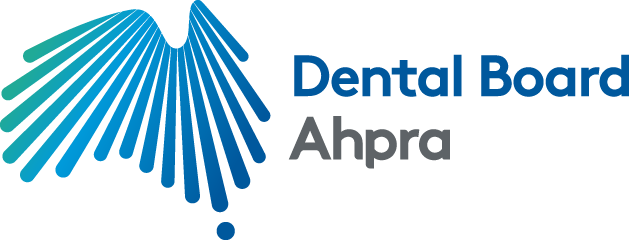Issue 26 – August 2022
Chair’s message

In this edition of our newsletter, I’m pleased to update practitioners about two important Board initiatives: the revised Code of conduct and new resources for infection prevention and control. Adhering to professional standards of conduct and maintaining good infection prevention and control are cornerstones of delivering safe and effective care to the community. The updated code and accompanying resources as well as the infection prevention and control resources will help practitioners achieve this.
As we come to the end of another winter with significant numbers of COVID-19 cases and high rates of other respiratory illnesses, I reflect on the resilience and perseverance demonstrated by dental practitioners over the past few years.
Practitioners have continued to show their commitment to professionalism and their patients, and to exercising professional judgement in prolonged difficult circumstances.
Don’t forget – if you’d like someone to talk to, call Dental Practitioner Support on 1800 377 700.
Our characters are the result of our conduct – Aristotle
Dr Murray Thomas
Chair, Dental Board of Australia
back to top
Board news
Revised Code of conduct is in effect
The revised Code of conduct for dental practitioners came into effect on 29 June. The code gives important guidance to dental practitioners about the Board’s expectations and the standard of conduct the public can expect from dental practitioners. Revising the code included extensive consultation, which helped to create a more useful, accessible and contemporary document for both dental practitioners and the public.
We’ve included the National Scheme’s definition of cultural safety in the revised code as well as guidance on how you can ensure culturally safe and respectful practice. This inclusion highlights the important role dental practitioners have in achieving equity in health outcomes between Aboriginal and Torres Strait Islander Peoples and other Australians to close the gap.
The revised code also includes guidance about the role of the Board in matters of bullying and harassment, information about practitioners’ responsibilities in these situations, and the importance of addressing the issue in the workplace. Good relationships with colleagues and other practitioners are an important part of providing good care.
Resources to help you understand the Code of conduct
To support you in understanding and applying the code, National Boards have developed supporting resources. These include a series of frequently asked questions (FAQs) and case studies which look at how the code could be applied in practice scenarios. National Boards have also developed a Code of conduct principles document, a one-page summary of the code, and encourage you to print a copy and place it somewhere visible. You can find these resources on the Resources to help health practitioners web page.
back to top
Infection prevention and control resources are in effect
The Dental Board of Australia’s new infection prevention and control resources came into effect on 1 July. The new resources replace the Guidelines on infection control.
The resources include a self-reflective tool, a fact sheet and a set of frequently asked questions (FAQs). They will allow practitioners to remain up to date with contemporary practices and support them to practise professionally.
The new resources will also allow the Board more flexibility in providing new information as it becomes available.
The new resources are in line with the Board’s incremental approach towards risk-based regulation. The resources have been developed to help practitioners continue to practise safely by providing a range of helpful information. This new approach the Board is taking will not require any changes to current practice. If you’re practising safely, keep doing what you’re doing.
We sincerely thank everyone who has been involved in developing these resources, particularly the dental practitioners who gave us their input. We encourage you all to visit our Infection prevention and control web page and familiarise yourselves with the resources.
back to top
Registration news
Latest workforce data released
Registration data for the period 1 April to 30 June 2022 shows that at this date, there were 26,038 registered dental practitioners in Australia:
- 23,242 had general registration (including 300 on the pandemic response sub-register)
- 1,804 had general and specialist registration
- 66 had specialist registration
- 40 had limited registration (postgraduate training, supervised practice, teaching or research), and
- 884 had non-practising registration.
Two practitioners had both general and non-practising registration
For more data, including registrant numbers by division of dental practice, age, gender and principal place of practice, visit our Statistics page.
back to top
Regulation at work
Specialist registration granted on appeal
A tribunal has granted specialist registration to a dental practitioner on appeal. Read more in the news item.
Consultation
We’re reviewing the English language skills standard – have your say
English language standards apply to all dental practitioners applying for registration in Australia. It’s time to review the standard that applies to dental practitioners applying for registration for the first time. The standard is consistent across all professions in the National Scheme, so all National Boards (except the Aboriginal and Torres Strait Islander Health Practice Board of Australia) are involved in this consultation.
You can share your feedback on the English language standard through the online consultation form or email written submissions using the Word template provided to ahpra.consultation@ahpra.gov.au.
The consultation closes on 7 September 2022.
For the consultation paper, the link to the online form, the Word template and more information, see the Ahpra Consultations page.
back to top
National Scheme news
Check out the new Resources hub
A new hub on the Ahpra website means it’s now easier to find helpful resources.
The Resources hub was launched in late June and aims to support practitioners’ professional practice and the public to make safer health choices. It consolidates multiprofession policy resources for practitioners and the public and makes resources easier to find.
The hub also links to National Board websites for profession-specific guidance and information.
Information is grouped for practitioners and the public so visitors to the hub can quickly locate the information relevant to them. For example, telehealth guidance for practitioners and what the public should look out for in health advertising.
New resources will be added to the hub as they are developed.
back to top
New podcasts released
Ahpra’s Taking care podcast series offers professional and consumer perspectives on current issues and answers some frequently asked questions about public safety in healthcare. Download and listen to the latest episode today. You can also listen and subscribe on Spotify, Apple Podcasts and by searching ‘Taking care’ in your podcast player
Providing safe healthcare for LGBTQIA+ communities as a practitioner is the focus of a recent Taking care episode, which follows our episode focusing on the patient experience.
We hear from clinical neuropsychologist, Board member of the Victorian Pride Centre, and Commissioner at the Victorian Multicultural Commission, Dr Judy Tang; and clinical psychologist and Senior Research Fellow, Dr Lee Cubis. Together they speak about the changes, small and big, that practitioners can make to deliver safe care to LGBTQIA+ patients.
Other new podcasts include: When cost is a barrier to good healthcare, and Safe and adequate healthcare for people experiencing homelessness.
back to top
Practitioners on temporary sub-register continue to support health system
There are more than 20,750 practitioners with temporary registration on the pandemic response sub-register (the sub-register) which enables them to return to practice and support the health system. They are Aboriginal and Torres Strait Islander Health Practitioners, dental practitioners (all divisions), diagnostic radiographers, medical practitioners, midwives, nurses, occupational therapists, optometrists, pharmacists, physiotherapists, podiatrists and psychologists.
All practitioners on the sub-register are registered until 21 September 2022 and can work to the full scope of their registration, subject to any notations.
So that practitioners who are currently practising can support our health systems for longer, we are writing to all practitioners on the sub-register in late August to provide information about the options available to them to stay registered. These include opting in to extend their temporary registration until 21 September 2023, or formally applying for registration on the main register (the Register of practitioners) using a transition pathway. Both forms of registration will take effect on 22 September 2022.
We continue to work with health departments during these challenging times to help as best we can. This includes our escalation of the assessment of applications for registration where critical workforce needs have been identified.
back to top
Board extends temporary acceptance of additional English language tests
National Boards are accepting the TOEFL iBT® Home Edition test for applications received until 21 February 2023.
COVID-19 pandemic lockdowns have disrupted many English language tests and made it difficult for some applicants to use the English language test pathway to meet National Boards English language skills registration standards.
In response, earlier this year the National Boards established a temporary policy accepting the following additional language tests for a limited time:
- the OET computer-based test and the OET@home test for applications received until 21 February 2023, and
- the TOEFL iBT® Home Edition for applications received until 1 June 2022.
National Boards have now updated this temporary policy which means that, along with the OET computer based and OET@home tests, the TOEFL iBT® Home Edition will also be accepted, for applications received until 21 February 2023.
All other requirements set out in the National Boards English language skills registration standards still apply. There are no changes to any other requirements in the standards, including minimum test scores.
back to top
Senate Committee tables its report
The Senate Community Affairs Reference Committee has tabled its report on the inquiry into the Administration of registration and notifications by Ahpra and related entities under the Health Practitioner Regulation National Law.
Ahpra actively engaged with the inquiry, with representatives of Ahpra, the Agency Management Committee and Community Advisory Council all appearing. There were public submissions and stakeholder appearances.
We will consider the recommendations directed to Ahpra and National Boards and contribute to the Australian Government response, as requested.
The report is available on the Inquiry web page.
back to top
Keep in touch with the Board
As always, we encourage you to regularly check the Dental Board website for information and updates relating to the dental profession.
- Visit our website for information on the National Scheme and the mandatory registration standards, codes, guidelines, policies and fact sheets. Board consultation papers are published on the site under News.
- Lodge an online enquiry form.
- For registration enquiries call 1300 419 495 (from within Australia) or +61 3 9285 3010 (for overseas callers).
- Address mail correspondence to: Executive Officer, Dental Board of Australia, GPO Box 9958, Melbourne VIC 3001.
back to top
